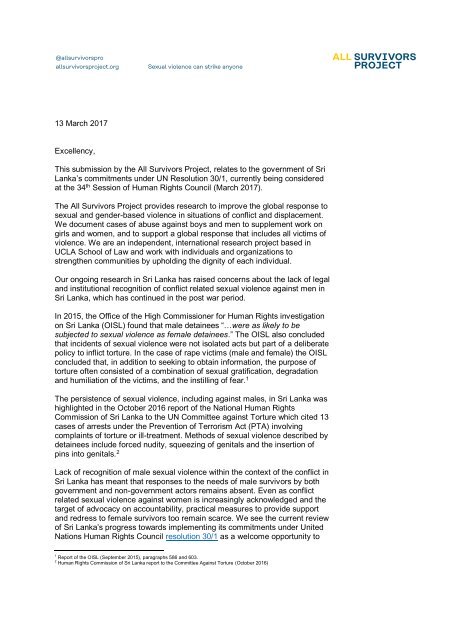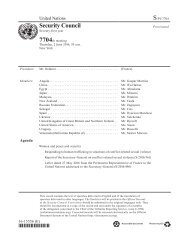Sri Lanka Letter to HRC Final
You also want an ePaper? Increase the reach of your titles
YUMPU automatically turns print PDFs into web optimized ePapers that Google loves.
13 March 2017<br />
Excellency,<br />
This submission by the All Survivors Project, relates <strong>to</strong> the government of <strong>Sri</strong><br />
<strong>Lanka</strong>’s commitments under UN Resolution 30/1, currently being considered<br />
at the 34 th Session of Human Rights Council (March 2017).<br />
The All Survivors Project provides research <strong>to</strong> improve the global response <strong>to</strong><br />
sexual and gender-based violence in situations of conflict and displacement.<br />
We document cases of abuse against boys and men <strong>to</strong> supplement work on<br />
girls and women, and <strong>to</strong> support a global response that includes all victims of<br />
violence. We are an independent, international research project based in<br />
UCLA School of Law and work with individuals and organizations <strong>to</strong><br />
strengthen communities by upholding the dignity of each individual.<br />
Our ongoing research in <strong>Sri</strong> <strong>Lanka</strong> has raised concerns about the lack of legal<br />
and institutional recognition of conflict related sexual violence against men in<br />
<strong>Sri</strong> <strong>Lanka</strong>, which has continued in the post war period.<br />
In 2015, the Office of the High Commissioner for Human Rights investigation<br />
on <strong>Sri</strong> <strong>Lanka</strong> (OISL) found that male detainees “…were as likely <strong>to</strong> be<br />
subjected <strong>to</strong> sexual violence as female detainees.” The OISL also concluded<br />
that incidents of sexual violence were not isolated acts but part of a deliberate<br />
policy <strong>to</strong> inflict <strong>to</strong>rture. In the case of rape victims (male and female) the OISL<br />
concluded that, in addition <strong>to</strong> seeking <strong>to</strong> obtain information, the purpose of<br />
<strong>to</strong>rture often consisted of a combination of sexual gratification, degradation<br />
and humiliation of the victims, and the instilling of fear. 1<br />
The persistence of sexual violence, including against males, in <strong>Sri</strong> <strong>Lanka</strong> was<br />
highlighted in the Oc<strong>to</strong>ber 2016 report of the National Human Rights<br />
Commission of <strong>Sri</strong> <strong>Lanka</strong> <strong>to</strong> the UN Committee against Torture which cited 13<br />
cases of arrests under the Prevention of Terrorism Act (PTA) involving<br />
complaints of <strong>to</strong>rture or ill-treatment. Methods of sexual violence described by<br />
detainees include forced nudity, squeezing of genitals and the insertion of<br />
pins in<strong>to</strong> genitals. 2<br />
Lack of recognition of male sexual violence within the context of the conflict in<br />
<strong>Sri</strong> <strong>Lanka</strong> has meant that responses <strong>to</strong> the needs of male survivors by both<br />
government and non-government ac<strong>to</strong>rs remains absent. Even as conflict<br />
related sexual violence against women is increasingly acknowledged and the<br />
target of advocacy on accountability, practical measures <strong>to</strong> provide support<br />
and redress <strong>to</strong> female survivors <strong>to</strong>o remain scarce. We see the current review<br />
of <strong>Sri</strong> <strong>Lanka</strong>’s progress <strong>to</strong>wards implementing its commitments under United<br />
Nations Human Rights Council resolution 30/1 as a welcome opportunity <strong>to</strong><br />
1 Report of the OISL (September 2015), paragraphs 586 and 603.<br />
2 Human Rights Commission of <strong>Sri</strong> <strong>Lanka</strong> report <strong>to</strong> the Committee Against Torture (Oc<strong>to</strong>ber 2016)
address ongoing challenges with respect <strong>to</strong> the needs of male survivors of<br />
sexual violence.<br />
Transitional Justice Mechanisms<br />
In Oc<strong>to</strong>ber 2015, the government of <strong>Sri</strong> <strong>Lanka</strong>, acting through the Human<br />
Rights Council, committed <strong>to</strong> an ambitious plan of legal, policy and<br />
constitutional reform <strong>to</strong> address past large-scale human rights violations and<br />
prevent their recurrence. As part of that process, the government pledged <strong>to</strong><br />
establish four judicial and non-judicial transitional justice mechanisms,<br />
including a Commission for Truth, Justice, Reconciliation and Non-<br />
Recurrence; an Office of Missing Persons; an Office for Reparations; and an<br />
Independent Judicial Mechanism <strong>to</strong> investigate allegations of violations and<br />
abuses of human rights and violations of international humanitarian law. 3<br />
A Consultation Task Force, comprising 11 members drawn from civil society,<br />
was established in January 2016 <strong>to</strong> undertake public consultations on the<br />
proposed mechanisms. Its final report, published in 2017, found a strong<br />
desire for truth and accountability amid a lack of trust and confidence in the<br />
government <strong>to</strong> deliver on its promises – the legacy of past inaction and<br />
numerous failed inquiries and accountability processes. 4 While survivors of<br />
sexual violence, both male and female, were hesitant <strong>to</strong> engage publicly in<br />
the consultations, at least one male victim did recount his experience openly. 5<br />
Demands for justice and reparations by victims of sexual violence were made<br />
repeatedly. While there was willingness <strong>to</strong> consider amnesties for some<br />
crimes, amnesties were not seen as appropriate in the case of war crimes,<br />
crimes against humanity, genocide, or for “crimes of sexual violence”. 6<br />
Recommendations received by the CTF in relation <strong>to</strong> the prosecution of<br />
sexual violence explicitly reference male sexual violence. One submission<br />
found that “...two thirds of persons affected by post war <strong>to</strong>rture are male” and<br />
that “[a]nal rape of male detainees by members of the <strong>Sri</strong> <strong>Lanka</strong>n security<br />
forces appears prevalent and is an even less recognised issue than vaginal<br />
and anal rape of women.” The report notes that “being gender sensitive in<br />
the prosecution of sexual violence will mean being sensitive <strong>to</strong> the needs of<br />
both men and women who have experienced sexual violence in the context of<br />
the war.” 7<br />
Both the CTF and OHCHR have recommended that the government draw up<br />
a clear strategy on how various transitional justice mechanisms will function,<br />
3 Resolution on “Promoting Reconciliation, Accountability and Human Rights in <strong>Sri</strong> <strong>Lanka</strong>, 25 September 2015, UN Doc.<br />
A/<strong>HRC</strong>/30/L.29.<br />
4 <strong>Final</strong> Report of the Consultation Task Force on Reconciliation Mechanisms, January 2017, available at,<br />
https://drive.google.com/drive/folders/0Bzl_GkvmvUNzM1ZKcENidk8zT0k<br />
5 <strong>Final</strong> Report of the Consultation Task Force on Reconciliation Mechanisms, January 2017, Chapter V, Section 10.2, “Males<br />
Affected by Sexual Violence”, page 274.<br />
6 <strong>Final</strong> Report of the Consultation Task Force on Reconciliation Mechanisms, January 2017, Chapter IV, Section 10.2.4,<br />
“Crimes and perpetra<strong>to</strong>rs beyond amnesty”, page 173.<br />
7 <strong>Final</strong> Report of the Consultation Task Force on Reconciliation Mechanisms, January 2017, Section 10.2 “Males Affected by<br />
Sexual Violence”, page 274.
elate <strong>to</strong> one another, and be coordinated and sequenced. 8 However, a<br />
roadmap is yet <strong>to</strong> be developed, with a series of ad hoc bodies 9 and technical<br />
working groups often working <strong>to</strong> disparate ends. The passing of legislation in<br />
August 2015 <strong>to</strong> establish an Office for Missing Persons marked some<br />
progress but the law has yet <strong>to</strong> be gazetted and commissioners have not yet<br />
been appointed. Further amendments <strong>to</strong> the OMP Act are also under<br />
consideration.<br />
The UN High Commissioner for Human Rights noted with concern in his<br />
February 2017 report that the design of truth and reparations mechanisms<br />
appear <strong>to</strong> have been prioritised by the government, with “little commitment <strong>to</strong><br />
the judicial mechanism…”, and with prepara<strong>to</strong>ry work on incorporating<br />
international crimes in<strong>to</strong> domestic law and strengthening investigative and<br />
prosecu<strong>to</strong>rial capacity yet <strong>to</strong> begin. 10<br />
Security Sec<strong>to</strong>r Reform<br />
Under Human Rights Council Resolution 30/1, the government also<br />
committed <strong>to</strong> security sec<strong>to</strong>r reform, including vetting processes that would<br />
ensure that any person implicated in violations of international human rights<br />
and humanitarian law will not be recruited or retained in the security forces.<br />
However, there is no indication that plans <strong>to</strong> implement this promise have<br />
been developed in any meaningful way. Vetting and screening must be an<br />
institutional requirement in all state services, including for members of staff of<br />
the transitional justice mechanisms, witness protection authorities and<br />
judiciary.<br />
The <strong>Sri</strong> <strong>Lanka</strong>n government has so far made no attempts <strong>to</strong> permanently<br />
dismantle regressive national security laws. While the government has<br />
committed <strong>to</strong> repeal the regressive Prevention of Terrorism Act (PTA), this<br />
law is <strong>to</strong> be replaced by another - the Counter Terrorism Act - which, based<br />
on the drafts in circulation, appears <strong>to</strong> be far wider in scope and even more<br />
repressive than the existing law. Such laws suspend ordinary due process,<br />
curb safeguards for detainees and create the environment in which systemic<br />
<strong>to</strong>rture and sexual violence takes place.<br />
We recommend that the Human Rights Council passes a further resolution on<br />
<strong>Sri</strong> <strong>Lanka</strong> which:<br />
• Affirms the government of <strong>Sri</strong> <strong>Lanka</strong>’s commitment <strong>to</strong> implementing its<br />
outstanding pledges under Resolution 30/1 (Oc<strong>to</strong>ber 2015), including<br />
8 <strong>Final</strong> Report of the Consultation Task Force on Reconciliation Mechanisms, January 2017, Section VIII, CTJ Conclusions<br />
and Observations, paragraphs 1.13 & 1.15, page 428; and Annual report of the UN High Commissioner for Human Rights and<br />
reports of the Office of the High Commissioner and the Secretary-General, Promoting reconciliation, accountability and<br />
human rights in <strong>Sri</strong> <strong>Lanka</strong>, 28 June 2016, UN Doc. A/<strong>HRC</strong>/32/CRP.4.<br />
9 There are at least three ministries directly dealing with reconciliation including of Ministry of National Integration and<br />
Reconciliation and Ministry of National Languages and Social Integration. The Government also established two new<br />
institutions the Office of National Unity and Reconciliation (ONUR) and the Secretariat for Coordinating Reconciliation<br />
Mechanisms (SCRM).<br />
10 Report of the Officer of the United Nations High Commissioner for Human Rights on <strong>Sri</strong> <strong>Lanka</strong>, 10 February 2017, UN Doc.<br />
A/<strong>HRC</strong>/34.20.
the establishment of all four mechanisms and other specific<br />
measures;<br />
• Welcomes the government’s creation of the CTF, the extensive<br />
national consultations, and the successful completion of its report,<br />
and encourage the government <strong>to</strong> present a process for reviewing<br />
and identifying an implementation strategy on recommendations;<br />
• Urges the government <strong>to</strong> deliver immediate and measurable<br />
confidence building measures in implementing transitional justice<br />
mechanisms, security sec<strong>to</strong>r reform, land returns, and the ending of<br />
military involvement in civilian activities.<br />
• Urges that an implementation timetable be presented which responds<br />
<strong>to</strong> recommendations contained in both the High Commissioner’s<br />
report and the CTF report and ensures continued international<br />
scrutiny until the <strong>Sri</strong> <strong>Lanka</strong>n government fully delivers on its<br />
commitments.<br />
We urge your delegation <strong>to</strong> support the inclusion of these elements in the<br />
resolution.<br />
In addition, we would like <strong>to</strong> draw attention <strong>to</strong> the issue of sexual violence,<br />
including of men, and wish <strong>to</strong> highlight the lack of recognition of the issue and<br />
the serious gaps in the legal and institutional responses <strong>to</strong> the needs and<br />
rights of victims of sexual violence. As such measures taken by the<br />
government in terms of design of transitional justice mechanisms, legal<br />
reform, redress through existing justice systems and health and other support<br />
systems must ensure that they enable appropriate responses and support for<br />
all victims of sexual violence including men, and that specific, proactive<br />
measures are taken in accordance with international best practice, <strong>to</strong> create a<br />
safe and conducive environment for survivors and their families <strong>to</strong> seek<br />
redress, justice and reparation.<br />
Sincerely,<br />
Charu Lata Hogg<br />
Direc<strong>to</strong>r<br />
All Survivors Project<br />
www.allsurvivorsproject.org<br />
Williams Institute,<br />
UCLA School of Law



